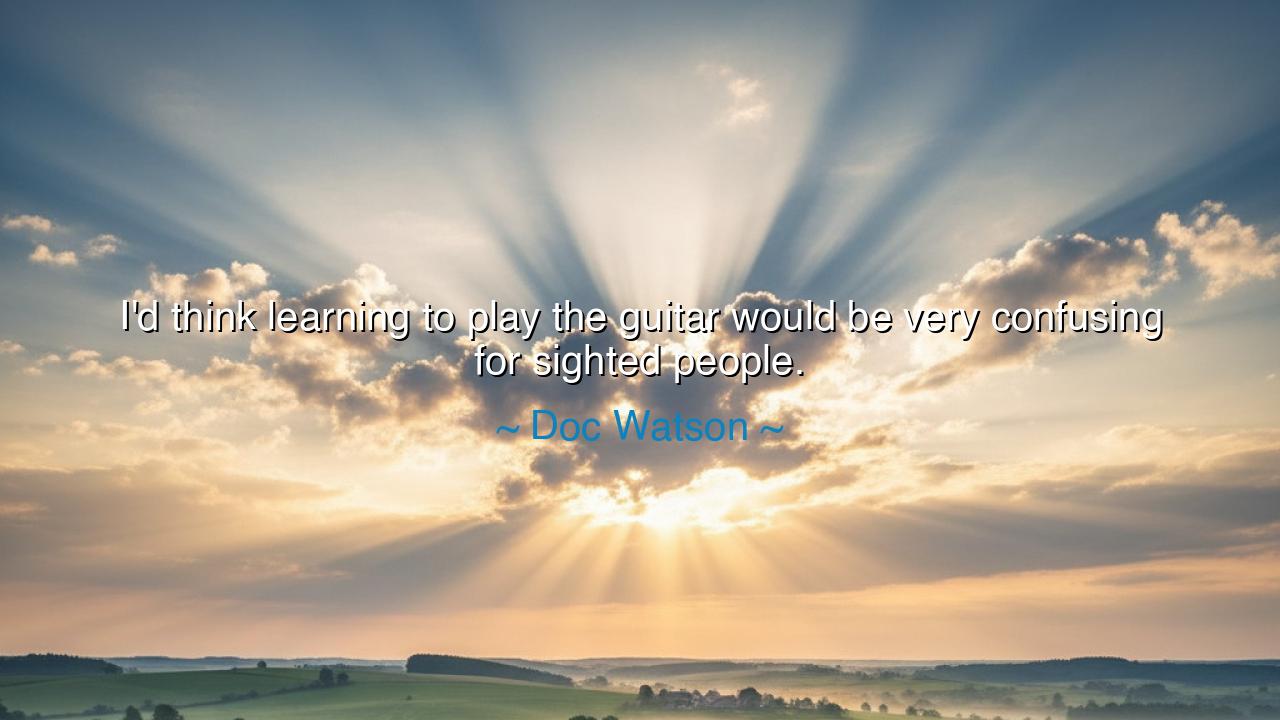
I'd think learning to play the guitar would be very confusing for






There are moments when humor conceals deep insight, when wit itself becomes a window into the human spirit. Such is the case with Doc Watson, the blind guitarist whose mastery of music transcended both sight and limitation. He once said: “I’d think learning to play the guitar would be very confusing for sighted people.” At first hearing, these words seem playful — a clever reversal of what most would assume. But beneath the jest lies a profound truth about perception, discipline, and the unseen sources of understanding that guide the human soul.
The meaning of Watson’s words rests on the paradox of limitation as strength. Born blind, he learned to experience music not through the eyes, but through the deep listening of the heart and hands. What sighted people perceive as visual — strings, frets, notes on a page — Watson knew only through touch, intuition, and sound. He implies that those who rely too heavily on what they see may actually be distracted from what they feel. In saying that the sighted might find it “confusing,” he reminds us that true mastery often comes when the senses are sharpened inward — when one listens not with the eyes, but with the soul.
The origin of this insight comes from a lifetime of perseverance. Born in the hills of North Carolina in 1923, Watson lost his vision as a baby, but his blindness became a teacher rather than a prison. Deprived of sight, he learned to perceive with depth — every note, every vibration, every breath of sound. He became one of the most influential guitarists of the twentieth century, blending folk, bluegrass, and blues into something timeless. His words, therefore, were not theory but testimony: that knowledge gained through hardship carries a wisdom the comfortable can seldom touch.
Watson’s statement also echoes an ancient principle — that clarity comes not from abundance, but from focus. The more the senses compete, the less the mind truly listens. The philosopher Epictetus, born a slave yet becoming one of Rome’s greatest Stoics, once said, “It is not what happens to you, but how you respond to it that matters.” In the same way, Watson’s blindness was not his undoing but his awakening. Sight might have been a distraction; in its absence, he learned to see the world in rhythm and resonance. Like the ancient seers who closed their eyes to glimpse the eternal, Watson’s “darkness” became his illumination.
In a broader sense, this quote speaks to all who struggle — to those who believe their disadvantages bar them from greatness. Doc Watson teaches that the obstacle is not the end of the path, but the beginning of understanding. When we are stripped of ease, we learn innovation; when one door closes, the spirit sharpens its tools to open another. History remembers countless souls who turned loss into light: Helen Keller, who could neither see nor hear, yet spoke of the beauty of vision; Beethoven, who composed his finest symphonies in silence. Like them, Watson’s mastery was born not in privilege, but in persistence.
Yet, there is also humility in his humor. When Watson calls guitar-playing “confusing for sighted people,” he is not mocking but teaching: that reliance on outward perception can cloud inward comprehension. The same is true in life. We often fix our eyes on appearances — success, status, recognition — and in doing so, we miss the music of meaning. The wise learn, as Watson did, to close the eyes and listen deeply: to the pulse of purpose, the rhythm of truth, the subtle harmony that lies beneath distraction.
Let this be the lesson drawn from his gentle wisdom: what limits you may also liberate you. The path to mastery is not found in having all the senses open, but in learning which ones to trust. When the world grows noisy and sight becomes blinding, close your eyes — not in retreat, but in revelation. Listen. Feel. Learn from the silence between the notes. For as Doc Watson discovered, clarity does not come from seeing more, but from seeing more deeply — and in that way, every limitation becomes an instrument of grace, and every soul a player in the grand music of life.






AAdministratorAdministrator
Welcome, honored guests. Please leave a comment, we will respond soon